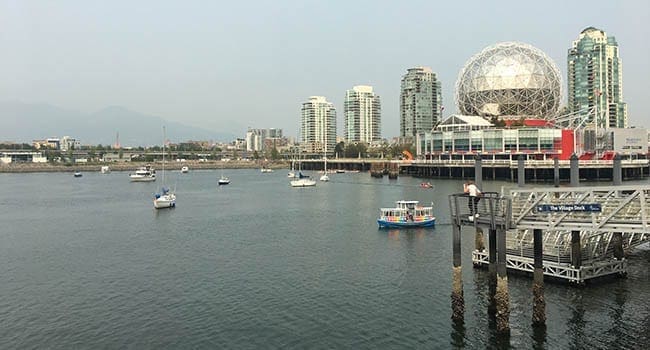
Olympic Village neighbourhood in Vancouver offers convenience and a bevy of amenities for those seeking an urban retirement lifestyle. Photo by Mike Robinson
 Who says you have to go on living in the same location when you retire?
Who says you have to go on living in the same location when you retire?
The choice is yours.
City or country retirement is ultimately a personal decision. But it draws significantly on your prior life, and the skills and personal attributes you can bring to the retirement community you choose.
How you retire is a multi-faceted decision based on a variety of factors: location, budget, amenities, your physical condition and general health, friendship maintenance and development, creative and volunteer pursuits, and heritage.
And needless to say, if you’re married or in a long-term relationship, the retirement plan must be mutually chosen and endorsed.
There’s also the potential middle ground of choosing both country and city locations, but the maintenance of two homes places double stresses on all the required skills and attributes.
We live the dual city/country lifestyle but a decision on a single home looms because of a growing love of our country residence, and the growing costs of maintaining a Vancouver pied-a-terre.
The tradeoffs of a country life are front of mind. What will be lost and gained by this decision?
Let’s begin by reviewing the costs and benefits of our Vancouver location.
At the outset I’ll also acknowledge the third-party example and counsel of my 97-year-old mother, born in the country and resident most of her life in the city. Only in the past two years has she abdicated independent living for a rest home that provides rooms, 200 fellow residents and meals. She is above all a strong advocate for maintaining independence of thought and action in retirement.
I spent all of my childhood and adolescence in Vancouver. After university and marriage, my wife and I left for a 30-year stint of Calgary employment during the last great oil boom. Our family and Vancouver friends were shocked at our departure. To say it was not a Vancouver norm would be a colossal understatement.
Our youthful experience of Vancouver was socially risk averse in the extreme. For us, Calgary was a complete adventure. It tested our resilience and gave us enormous career rewards.
The Vancouver return in the final stages of our careers demonstrated a homing instinct, driven by family presence, the coastal climate and the lure of old friends. We had always thought of retiring on the coast and assumed because of genetics that the final quartile of our lives would be spent there.
What we didn’t assume were the budgetary stresses of moving ‘home’ to a city transformed by affluent Asian in-migration and consequent real estate price upheavals. Returning to Vancouver meant renting rather than owning, at least initially. Leaving 2,200 square feet of house in Calgary for 700 square feet of condo rental in Olympic Village was our new reality. To buy our Vancouver condo would have cost $200,000 more than our Calgary detached house’s sale price.
Olympic Village was chosen for more than just budgetary reasons. Environmentally, it’s the most responsible LEED (Leadership in Energy and Environmental Design) neighbourhood in the city. In terms of amenities, it’s also a leader, given the bleeding of retail resources throughout the city because of inflated land values and rising rents.
Unbelievably, there’s no major food store serving the university district anymore as the nearby Safeway has closed. The same pattern is repeating itself citywide. At least the Olympic Village has an Urban Fare grocery store, and is adjacent to restaurants featuring multiple ethnic cuisines, coffee shops, a medical clinic, a dentist, two banks and a pharmacy. This clustering of walkable urban amenities is a major advantage. The additional walkability of the adjacent Main Street retail corridor is also a major locational plus.
From the health-care perspective, the Vancouver General Hospital is visible from our condo and ambulance sirens (especially after nightfall!) are omnipresent indicators of emergency access.
Social care, in terms of old friendships, is also present, along with multiple theatre, gallery, movie and sports venues.
It would appear at first glance that deciding to be a city retirement mouse is obvious.
Next week we’ll consider the competing perspectives of a country mouse retirement.
Mike Robinson has been CEO of three Canadian NGOs: the Arctic Institute of North America, the Glenbow Museum and the Bill Reid Gallery. Mike has chaired the national boards of Friends of the Earth, the David Suzuki Foundation, and the Canadian Parks and Wilderness Society. In 2004, he became a Member of the Order of Canada.
The views, opinions and positions expressed by columnists and contributors are the author’s alone. They do not inherently or expressly reflect the views, opinions and/or positions of our publication.
